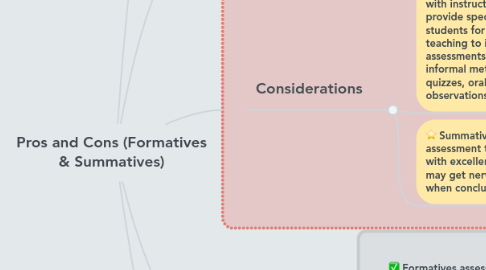Pros and Cons (Formatives & Summatives)
by Richard Welford

1. Pros
1.1. Formatives assessments provide instant feedback for teachers on student understanding and can help teachers planning. Students receive feedback so they understand their strengths and weaknesses and can therefore concentrate their efforts on specific parts of the unit.
1.2. Summative assessments provide encouragement and motivate students)
2. What?
2.1. Formative assessments are ongoing and consistent. Summative assessments usually occur at the end of a unit/academic year
3. Cons
3.1. Formative assessments are time consuming
3.2. Summative assessments compels teachers to ¨teach to the tests¨
4. Why?
4.1. Formative assessment is an ongoing process. This allows feedback so students can understand their strengths and weaknesses. Summative assessment (at the end of a specific unit) tests student knowledge and understanding
5. Considerations
5.1. Formative assessments occur concurrently with instruction. These ongoing assessments provide specific feedback to teachers and students for the purpose of guiding teaching to improve learning. Formative assessments include both formal and informal methods, such as ungraded quizzes, oral questioning and teacher observations)
5.2. Summatives assessments allows no assessment to be perfect, so even students with excellent knowledge of the material may get nervous and feel under pressured when concluded.


